A deployed chaplain assistant
He didn't plan to stay in the Army. Joe Stanfield planned to get out with a college degree after his two-year commitment. Nine years later, he's still in the Army. He has the degree, and is working on another. Stanfield's not sure what the future holds, he knows one thing-he loves his job. He's a chaplain assistant.
Staff Sgt. Joe Stanfield, from Del City, Okla., enlisted in the Army as a CA. His nine weeks of advanced individual training included learning about different types of religions and how to set-up services for them, how to type memorandums and perform other clerical duties, and obtaining the skills needed to engage in combat, if necessary.
Stanfield is deployed to Iraq with Headquarters and Headquarters Company, 3rd Infantry Brigade Combat Team, 25th Infantry Division. Stanfield and his chaplain, Maj. Mike Burgess, are together a unit ministry team (called a religious support team in theater) at the brigade headquarters on Contingency Operating Base Speicher, near Tikrit. From COB Speicher, they provide religious services and support to the Soldiers and civilians in the brigade and on base.
Burgess and Stanfield aren't always on the COB. A large part of their job is to advise and support the RSTs-the chaplains and their assistants in the brigade's six battalions-and that means traveling to the forward operating bases around Salah ad-Din province. Together, the brigade and battalion RSTs are supporting more than 3,500 Soldiers and Department of Defense civilians.
Soldiers need clothing and equipment; food, water and rest; training and a mission; and leadership. Many times throughout history, Soldiers didn't always have or get what they needed, so they made do with what they had, or they did without. It was during those times, Stanfield said, that they needed the one thing they couldn't do without: faith.
Stanfield believes today's Soldiers accomplish the mission because they still have faith-not necessarily in the religious sense-but they must believe in themselves, their buddies and their leaders, to build and train a cohesive unit. Success comes from confidence, which comes from trust, which is born of faith.
Those in need of spiritual leadership, or just someone to talk to while deployed, can turn to Army chaplains and chaplain assistants.
"In the chaplaincy, we come into contact with people from all different walks of life, cultures and religions, and there is a different situation that each person brings when they walk into the chapel or the office," said Stanfield.
Soldiers have to deal with the everyday stressors of life: relationships, bills, family crises, personal- and work-related problems. Add to that the hardships of a deployment, being away from home and family; enduring the stress of combat; and suffering injuries, both physical and mental-including the loss of fellow Soldiers-and seemingly everyday issues can compound.
The Army CA is one of the most highly trained and skilled Soldiers in the Army when it comes to assisting Soldiers, families and civilians with day-to-day challenges, Stanfield said. They attend a variety of schools, undergoing extensive training that equips them to deal with issues that Soldiers and families face.
After basic training, chaplain assistants undergo seven weeks of advanced individual training at the U.S. Army Chaplain Center and School at Fort Jackson, S.C., where they learn the skills required to support chaplains during missions and everyday activities. While in school, Soldiers become well versed in all manner of religious support activities, from coordinating force protection for religious support operations in a combat zone, to answering commanders' critical information requirements by researching religious information. Students also learn how to manage a multitude of resources while coordinating religious support for all faith groups.
Reserve Soldiers who wish to change their occupational specialty to chaplain assistant receive training at one of several USACHCS affiliate schools, and have one year from the time they are appointed as chaplain assistants to complete two separate phases of training.
"During my nine years of service, I have had the opportunity to help Soldiers and families in areas such as religion, marriage counseling, suicide prevention, addiction, parenting, death, financial issues, moral issues, and resiliency, and (sometimes) we refer them to other agencies if necessary," said Stanfield.
The RSTs are on the front lines in the battle against two of the biggest problems facing Soldiers: divorce and suicide.
"If families and couples are not strong, it affects not just the Soldier and family member, it affects the command as a whole," said Stanfield.
"We conduct pre-marital and marriage counseling for them to help them understand and know some of the challenges that may come with being married that many couples never ask each other, giving them tools and advice on how to make their marriage stronger," said Stanfield.
The same is true of individual Soldiers. Burgess and Stanfield have led suicide prevention classes for their unit, so Soldiers can learn how to watch for warning signs in themselves and their fellow Soldiers.
"We help them understand the seriousness of suicide, teach them prevention skills, and how to help those who may be having suicidal thoughts, so they understand that taking their own life isn't the answer-that there are many reasons for them to live," said Stanfield.
Just as a CA works to better the lives of others, he or she also helps Soldiers and families deal with death. The most solemn duty of the deployed RST is the memorial ceremony held for a fallen Soldier. Another important duty is when a deployed Soldier receives a Red Cross message. The unit commander informs the Soldier, accompanied by the chaplain and his assistant, who are there to offer support.
Part of an NCO's job is getting the Soldier to believe in his abilities, and as the Soldier succeeds at a task or improves his proficiency in a skill level, his NCO challenges him to strive for more. As a brigade CA, one of Stanfield's duties is to coach and mentor the battalions' CAs.
The brigade CA is also the NCOIC who supervises the battalion CAs to ensure they are properly supporting the chaplains, so that all Soldiers within their command's area of responsibility are afforded the opportunity to worship in whatever faith group they choose.
Stanfield reminds Burgess to make sure the battalion chaplains counsel their assistants. "We cover each other's backs, because I don't think just the chaplain can do it. He needs the NCO to give him perspective," said Burgess.
Chaplains are non-combatants, so one of the duties of the CA is to provide or coordinate security for the chaplain while deployed.
The chaplain assistant also coordinates transportation, lodging, facilities and supplies so the chaplain can focus on his job-offering religious and support services.
With the exception of providing security for the chaplain, the CA does the same things while deployed that he does in garrison, while working longer hours in a combat zone, said Stanfield. In garrison, there may be several chaplains and assistants who work shifts, but when deployed, the chaplain is on call 24 hours a day, and so is the CA, so they must work well together.
"He's candid, he tells me what he thinks; even if we disagree. A good assistant is one you trust-you don't have to micromanage them," said Burgess.
A strong faith is not required to be a CA, but Stanfield is strong in his faith, and that makes him a better asset to the chaplain and the Soldiers, Burgess said.
As a CA, Stanfield can reach enlisted Soldiers who may not feel comfortable talking with the chaplain because of their rank. Some Soldiers see chaplains as officers and are reluctant to talk to them. These Soldiers are more likely to confide in the CA, who is enlisted and endures the same training. He checks on morale and welfare issues, and reports any potential religious or morale issues to the chaplain, who then reports those issues to the commander and recommends courses of action.
"The best thing about being a chaplain assistant is knowing that I am helping Soldiers get closer to their God by providing them with worship material, a location for worship, encouraging them to talk to the chaplain when they have a religious question, and helping them through tough situations in their lives," said Stanfield.
"Knowing...that you have done your job and helped a Soldier is the best feeling that I have," he said. "It makes you feel good knowing that you have...given someone a gift that will have a positive bearing on their life."
A chaplain assistant in garrison
Two hands enclose a chapel formed on a gold disc. The hands symbolize the support the chapel and all religious programs receive. The chapel's open doors welcome all who come to worship, regardless of religion. This distinctive collar insignia represents the roles and responsibilities of the chaplain assistant.
Sergeant Marvin Stow tries to embody the symbolism held within that gold disc every day. He is a CA at Fort Belvoir, Va.
A CA doesn't have to be religious, but Stow was involved with the ministry before he joined the Army, as a nursing home minister, and eventually, outreach director. It was shortly after those experiences that Stow enlisted.
"I joined the Army, because I was looking into being a chaplain. I wanted to experience it from the enlisted side (first), to get a well-rounded view."
Stow and his wife were heavily involved in their churches in both Schweinfurt and Wurzburg, Germany, while he was stationed there between 2003 and 2006. He left the Army to serve on a yearlong mission trip to the Kingdom of Tonga, an archipelago south of Samoa in the South Pacific. Stow rejoined the Army about two years ago.
Unlike his deployed peers, Stow doesn't carry a weapon or set up security details for his chaplain. But, he stressed that CAs are integral to the Army, regardless where they serve.
"I believe in our constitutional right of freedom of worship, and I understand that some do not actively pursue God," Stow said. "But for those who do, or who want to, the resources and chaplains are in place to provide those very important services."
And CAs are there to support those chaplains. Stow said the most challenging aspect of the job is balancing responsibilities and prioritizing the broad range of tasks.
"It's not just sitting at a desk and writing a few memos," he said. The job involves, but is not limited to: coordinating funding associated with the gamut of religious support services, replenishing supplies, setting up for religious services and programs, and organizing special services like funerals and memorials. And like any Soldier, Stow said he and his peers continue to take care of their Soldier responsibilities, which often include collateral duties and leadership positions within their supported commands.
While they don't experience the danger inherent to providing tactical religious support in a combat zone, Stow and other CAs serving in garrison, shoulder their share of responsibilities while supporting their Army communities.
As a CA, Stow is also the tithes and offering funds clerk and the NCO-in-charge at Belvoir Chapel. Although he is responsible for providing support for more than a dozen religious services and events each week, he said being the funds clerk occupies much of his time.
"The fund brings in about $1.5 million a year, which is dispersed in increments as small as $20." From those funds, Stow must coordinate pay for about 50 support contractors, and, with the help of other Soldiers, purchase all necessary supplies (to include food and other items for religious services). He is also responsible for bank deposits, and he maintains various financial and logistical records. Somehow, he manages to keep everything straight.
"It takes discipline and time management. You have to prioritize your missions to be effective."
While the countless administrative duties keep him busy-and help take the burden of the minutia off the chaplain-Stow said the non-measurable aspects of the job are the most gratifying.
"The most rewarding thing for me is seeing the families of Soldiers able to pursue God in an environment they understand and know...especially in overseas areas like Germany," Stow said, where Soldiers are often separated from friends and family.
Although CAs do not provide counseling, they are in a unique position to offer help, often serving as the bridge between enlisted Soldiers and their chaplains. "We listen, acknowledge, empathize and direct," Stow said. "It definitely improves morale and provides many Soldiers with inner strength."
Some CAs are not religious, and some serve with chaplains whose faith differs from their own. But Stow insisted the most important trait required of a CA is empathy.
"Occasionally, there are instances where a chaplain is called for an emergency such as a suicide or other tragedy," Stow said. "I have learned to be as cordial as possible...because there are some people who have really serious problems."
Take for example the story of a divorced spouse whose ex-husband was overseas. The woman was living in a shelter just outside Fort Belvoir with her daughter. Stow and others were able to help get the family temporary lodging and food.
"The chaplaincy is an empathetic place, where even (people) who no longer have (ties) to the military can get help," Stow said. "(We) are not a charity, but we are charitable by nature, and many people come to us for help.
It is really a giving situation."
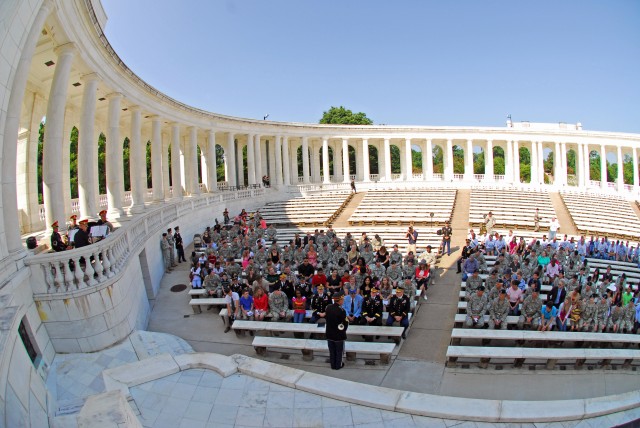
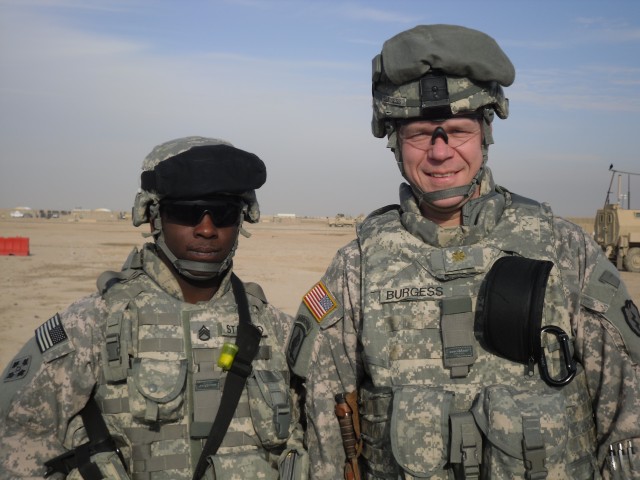
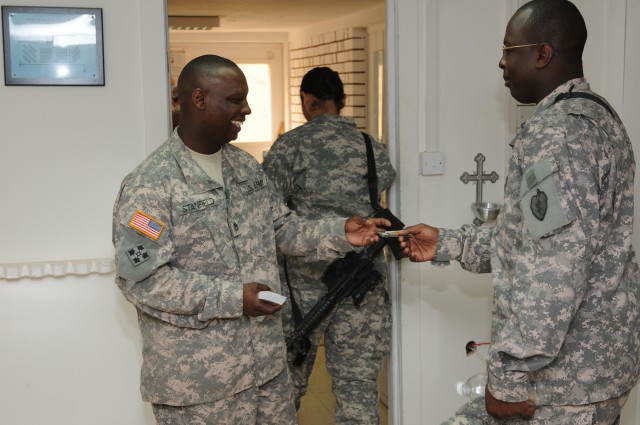
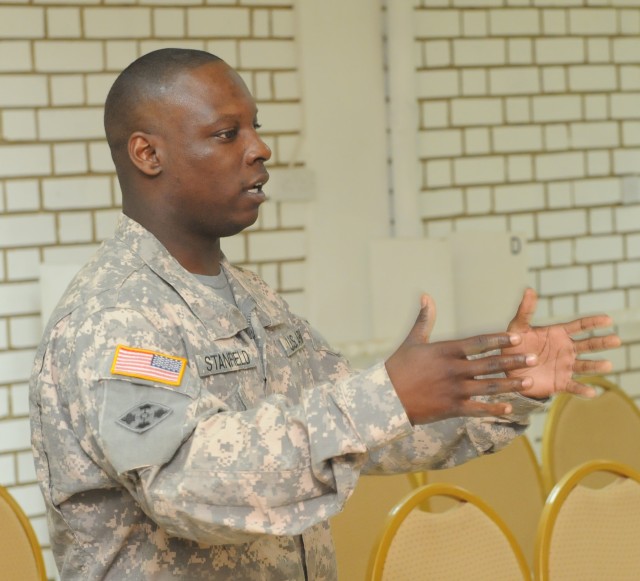
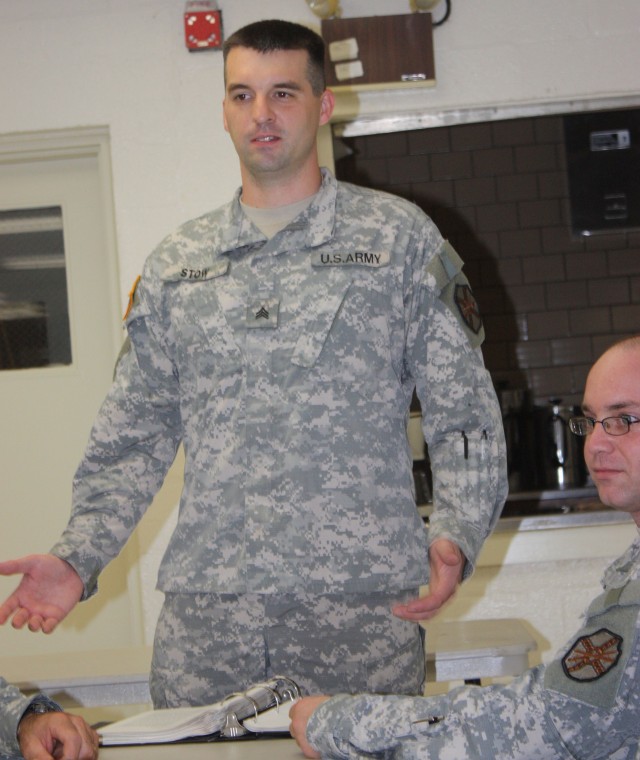





Social Sharing